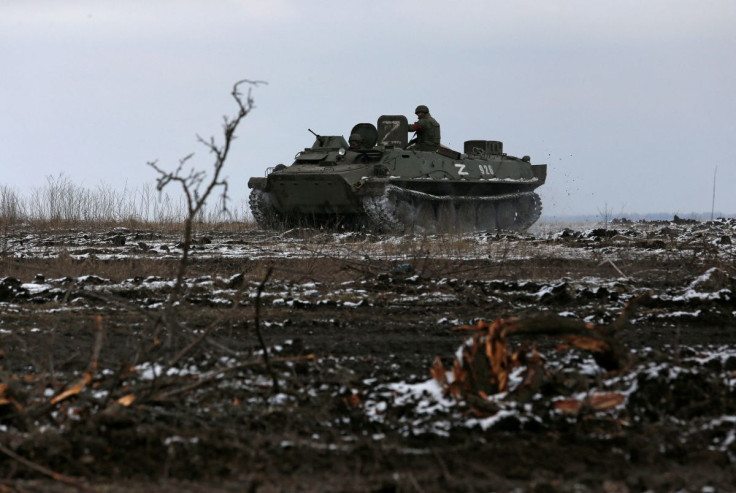Russia Captures Centre Of Lyman, Encircles Most Of Sievierodonetsk

Russian forces in eastern Ukraine captured the centre of the railway hub town of Lyman and encircled most of Sievierodonetsk, Ukrainian officials acknowledged on Friday, as Kyiv's forces fell back in the face of Moscow's biggest advance for weeks.
Ukraine insisted its forces were still holding firm at new defensive lines in the eastern Donbas region, despite the apparent Russian advances on two of the major fronts there, battles that showed how momentum has shifted in recent days.
Moscow's separatist proxies said they were fully in control of Lyman, a railway hub that Russia has been attacking from the north in one of the main axes of its advance.
Ukrainian officials acknowledged that Russia had captured most of the town. But the defence ministry said forces were still holding out in northeastern and southwestern districts, blocking the Russians from launching an advance towards Sloviansk, a major city a half-hour drive further southwest.
Further east, Russian forces had encircled two-thirds of the city of Sievierodonetsk, Luhansk regional governor Serhiy Gaidai said. The city is the easternmost major population centre still held by Ukraine in the Donbas, and Russia has been trying to trap Ukraine's main fighting force inside it and its twin city Lysychansk across the Siverskiy Donets river. Ninety percent of buildings in Sievierodonetsk were destroyed, Gaidai said.
Oleskiy Arestovych, an adviser to Ukraine's president, said in an interview overnight that Lyman had fallen, and that the well-organised Russian attack there showed that Moscow's military was improving its tactics and operations.
After being driven back from the capital Kyiv in March and from the outskirts of the second biggest city Kharkiv earlier this month, Russian forces are staging their strongest advance in weeks in the eastern Donbas region.
The advance has gained ground since Russian forces broke through Ukrainian lines south of Sievierodonetsk in the city of Popasna last week.
Popasna, reached by Reuters journalists in Russian-held territory on Thursday, was a blasted wasteland of burnt-out highrise apartments and shattered municipal buildings. Russian tanks and other military vehicles tore through the rubble-strewn streets kicking up dust with their treads, and low-flying attack helicopters thundered overhead. The bloated body of a dead man in combat uniform lay in a courtyard.
Natalia Kovalenko had finally come up in recent days from the cellar where she had been sheltering, to sleep amid the wreckage of her own flat. The balcony had been blown away and windows blasted off by a direct hit from a shell.
She stared out wistfully into the blasted courtyard, recounting how two people had been killed there and eight wounded by a shell when they went outside to cook. Inside her flat, her kitchen and living room were filled with rubble and debris, but she had tidied a small bedroom to sleep. She was tired of being trapped in the cellar with dogs and cats.
"I just have to fix the window somehow. The wind is still bad. Cold at night," she said. "We are tired of being so scared. So tired."
Russian ground forces have now captured several villages northwest of Popasna, Britain's Ministry of Defence said.
'WHAT PRICE'
Russia's advance in the east follows a Ukrainian counter-offensive that pushed Russian forces back from Kharkiv this month. But Moscow has prevented Ukrainian forces from attacking the rear of Russian supply lines to the Donbas.
On Thursday, Russian forces shelled parts of Kharkiv itself for the first time in days. Local authorities said nine people were killed. Reuters filmed as shells burst in a neighbourhood sending clouds of smoke into the sky. A busy pavement was filled with broken glass and a pools of blood. A park's coffee kiosk had been destroyed and windows were blasted out of a cafe and apartment blocks. The Kremlin denies targeting civilians.
In the south, where Moscow has also seized a swathe of territory since the Feb. 24 invasion, Ukrainian officials believe Russia aims to impose permanent rule.
The Ukrainian military's southern command said Russia was shipping in military equipment from Crimea, building a third line of defence to prepare for a potential Ukrainian counter-attack, and mining the banks of a huge reservoir behind a dam on the Dnipro River that separates the forces.
"All this indicates that Russia will try to keep the occupied territories under its control," it said.
In an overnight address, Zelenskiy criticised the European Union for dithering over a ban on Russian energy imports, saying the bloc was funding Moscow's war effort with a billion euros a day.
"Pressure on Russia is literally a matter of saving lives. Every day of procrastination, weakness, various disputes or proposals to 'pacify' the aggressor at the expense of the victim merely means more Ukrainians being killed," he said.
Western countries led by the United States have provided Ukraine with long-range weaponry, including M777 howitzers. Kyiv says it wants longer range ground weapons, especially rocket launchers, to help it win artillery battles.
U.S. officials say the Biden administration is now considering supplying Kyiv with the M142 High Mobility Artillery Rocket System (HIMARS), which can have a range of hundreds of kilometers.
Washington had held back from supplying such arms partly over concern of escalation should Ukraine hit targets deep within Russia. U.S. and diplomatic officials told Reuters Washington has discussed this with Kyiv.
"We have concerns about escalation and yet still do not want to put geographic limits or tie their hands too much with the stuff we're giving them," said one U.S. official on condition of anonymity.
Russian Foreign Minister Sergei Lavrov warned that any supplies of weapons that could reach Russian territory would be a "a serious step towards unacceptable escalation".
Russia calls its invasion of Ukraine a "special military operation" to defeat "Nazis" there. The West describes this as a baseless justification for a war of aggression.
© Copyright Thomson Reuters 2024. All rights reserved.





















